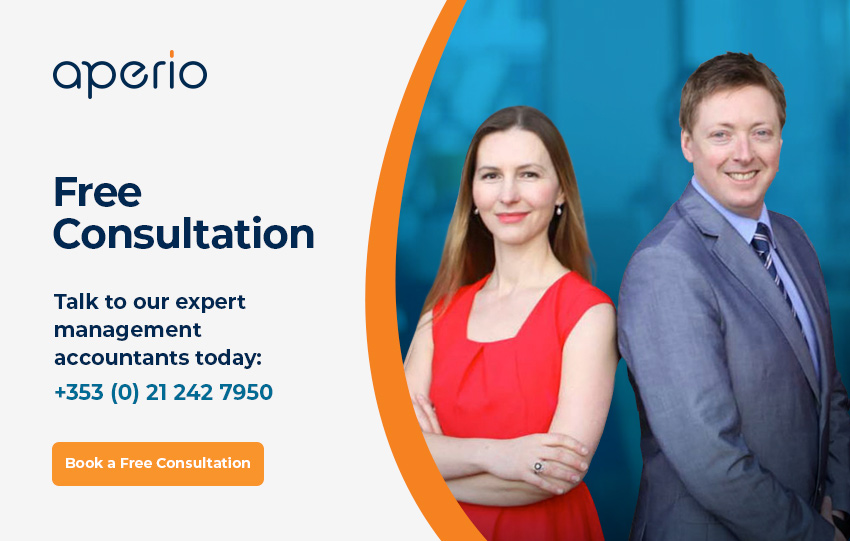Blog
4 Things Start-ups Need To Know About VAT

To help those starting their own business in Ireland, we have picked 4 things Startups need to know about VAT in Ireland.
There has been a huge rise in business start-ups over the past few years and even more so now that life is returning to “normal”. These startups include a new generation of business owners trying to figure out what VAT is and how it works. Therefore, we at aperio decided to write an article here to help answer your VAT questions in plain and simple English.
What Is VAT And How Does It Apply To A Company in Ireland?
VAT is an indirect tax imposed by the Government that is based on consumption i.e. if you buy you pay! It is applied to the price of goods and services paid by the end-user/customer. VAT is included in the sale price in Ireland.
Each business in the chain of supply (manufacturer, wholesaler and retailer) acts as a VAT collector. This means that they calculate and collect the correct VAT amount from their customers and include that VAT in their VAT return to Revenue.
When returning the tax collected to Revenue, they can reclaim it as appropriate. VAT which has been charged to them by their suppliers.
Who Needs To Register In Ireland?
Whether or not you as an individual or company should register for VAT depends on what you do and the value of your sales.
Firstly, you need to consider if the product or service you provide is liable for VAT or not.
Most products and services are liable for VAT. However, there are exemptions for areas such as medical, training, financial or Not-For-Profit services. If your product or service is exempt, you cannot register for it.
Secondly, you need to consider if you will exceed the threshold limits of €37,500 for seeking services and €75,000 for selling goods.
If you don’t see yourself going over those limits in 12 months, then there may not be a need for you to register.
Thirdly, you can register if your product or service sales fall below the thresholds above and you want to claim significant tax on purchases or if you trade with other EU member states e.g. Germany, France, Belgium etc.
What Are The Different Rates Of VAT That Apply To A Business In Ireland?
The highest band rate in Ireland is among the highest in Europe, at 23%. This is applied to the majority of goods and services such as, consumer electronic goods and professional services.
The next rate is 13.5%. This is applied to most ‘personal’ services. Examples include car repairs, cleaning, construction work and domestic electricity supply.
Below that is the second reduced rate of 9% which applies to the hospitality sector, for things such as meals and accommodation. Alcoholic drinks are not included. However, non-alcoholic drinks are included.
There is also a zero rate which covers most unprepared food, books and general non-luxury items.
One of the most confusing aspects of the system to new business owners is the difference between exempt and zero-rated VAT.
The net effect is the same when it comes to sales. Zero-rated businesses may claim the tax back on their purchases.
Your Business Must Be Compliant
If you register for value-added tax, be aware that you will have to be vigilant about keeping proper records, invoices and receipts to calculate the amount of money you owe Revenue or they owe you in respect of each of the different rates. It is important to note that records must be kept for 6 years regardless of whether the company is registered for it or not.
Returns can be filed on a bi-monthly, four-monthly, quarterly, or annual basis depending on the agreement made with Revenue. Businesses generally file returns on a bi-monthly basis.
If the appropriate amount of value-added tax is not paid at the correct time or you fail to comply with specific obligations under VAT legislation, Revenue has the right to impose penalties.
Avoid The Confusion
Start-ups and existing businesses tend to have the same questions about this form of tax. Some businesses are even confused after many years of trading. In this next section, we will answer some of the most common questions we get asked about it.
Is VAT An EU Tax?
No, the EU’s institutions do not collect the tax, but individual EU member states are each required to adopt a VAT that complies with the EU tax code. Sales outside the EU for example to the United States are not relevant for this tax.
Are Sales Outside Of Ireland But Within The EU Exempt?
VAT within the EU by two registered businesses is generally VAT exempt. Depending on the countries the businesses are situated, different compliance rules may apply.
Can Businesses With VAT And VAT-Exempt Activities Separate The Two?
Yes, they can pro-rate or separate the two activities for tax purposes.
Can it Be Claimed On Personal Purchases?
VAT can only be claimed on purchase invoices if the purchase can be proven to be for business purposes.
Is VAT On Meals, Accommodation And Entertainment Claimable?
VAT on purchases for hospitality (meals and accommodation), entertainment and petrol for motor cars are not claimable.
VAT can be a complicated and time-consuming issue for businesses. Therefore many choose to hire a professional accountancy agency to maintain their records throughout the year. This article is a general guide to this tax for businesses in Ireland. If you wish to discuss your circumstances further and in more detail, we would be glad to help you.
Book A Free Consultation
Are you looking for professional help? aperio is a Cork-based outsourced accounting and consulting company that can take care of all your company formation, bookkeeping, management accounting, financial compliance, and financial project work such as grant applications.
Click here to schedule a call with us.


